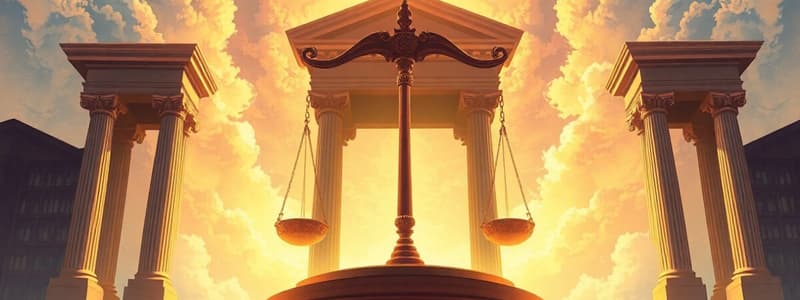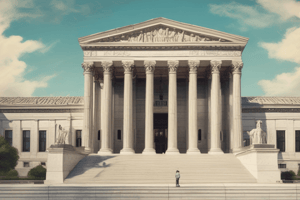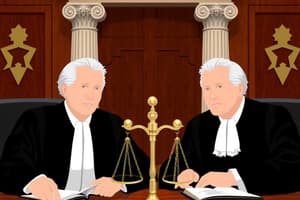Podcast
Questions and Answers
What function does the U.S. Court of Appeals primarily serve?
What function does the U.S. Court of Appeals primarily serve?
- To issue original jurisdiction rulings
- To hear cases for the first time
- To establish new federal laws
- To review errors in decisions made by lower courts (correct)
Which of the following is an example of a legislative court?
Which of the following is an example of a legislative court?
- U.S. District Court
- Supreme Court
- U.S. Tax Court (correct)
- U.S. Court of Appeals
What is the highest court to which a case can ultimately be appealed?
What is the highest court to which a case can ultimately be appealed?
- State Supreme Court
- District Court
- U.S. Court of Appeals
- U.S. Supreme Court (correct)
What is the first step in the process of appealing to the U.S. Supreme Court?
What is the first step in the process of appealing to the U.S. Supreme Court?
Which of these types of courts is established by Article 3 of the Constitution?
Which of these types of courts is established by Article 3 of the Constitution?
What is a typical reason for the Supreme Court to agree to hear a case?
What is a typical reason for the Supreme Court to agree to hear a case?
In the appeals process, if the appellate court does not find an error in the lower court's decision, what happens?
In the appeals process, if the appellate court does not find an error in the lower court's decision, what happens?
What is the primary purpose of criminal law?
What is the primary purpose of criminal law?
Which type of jurisdiction allows a case to be heard in more than one type of court?
Which type of jurisdiction allows a case to be heard in more than one type of court?
Which court has the authority to review the decisions of lower courts?
Which court has the authority to review the decisions of lower courts?
What distinguishes civil law from criminal law?
What distinguishes civil law from criminal law?
What is the highest court in the U.S. judicial system?
What is the highest court in the U.S. judicial system?
Which type of court typically conducts civil or criminal trials before a judge or jury?
Which type of court typically conducts civil or criminal trials before a judge or jury?
What is original jurisdiction in the context of court systems?
What is original jurisdiction in the context of court systems?
Which court stands between trial courts and the state's highest court?
Which court stands between trial courts and the state's highest court?
Flashcards are hidden until you start studying
Study Notes
Dual Court System
- The United States has a dual court system.
- The federal court system: Supreme Court, district courts, courts of appeals.
- The state court system: Trial courts, appellate courts, etc.
- The state court system handles most cases in the US.
- Both handle different issues and grievances at their respective levels.
Civil vs. Criminal Law
-
Criminal Law: covers actions that break the law and harm the community.
-
The government prosecutes criminal cases.
-
Conviction may lead to fines, imprisonment, or even the death penalty.
-
Example: A person driving under the influence causes a fatal car crash, the government will file charges.
-
Civil Law: involves private rights and disputes between individuals or groups.
-
The plaintiff argues that they have been wronged and the defendant must defend against the accusations.
-
Example: In a hit and run case, the victim's family may file a civil suit for wrongful death and sue for damages, in addition to criminal charges.
Jurisdiction
- Jurisdiction: The authority of a court to hear and rule on a case.
- Jurisdiction determines whether a case is heard in state or federal court.
- Exclusive Jurisdiction: One court has sole authority to hear a case.
- Concurrent Jurisdiction: A case may be heard in more than one type of court (state or federal).
- The plaintiff may choose the most beneficial court.
Jurisdiction
- Original Jurisdiction: The authority to hear a case for the first time.
- Appellate Jurisdiction: The authority to review the initial decisions of a lower court.
- Trial courts, both state and federal, have original jurisdiction.
- Courts of appeals, both state and federal, have appellate jurisdiction.
State Courts
- Trial Courts (Superior Court): Civil or criminal trials held before a judge or a jury.
- Intermediate Appellate Courts: Review decisions of trial courts in appeal cases.
- State Supreme Court: Highest court in the state judicial system.
Federal Courts
- Supreme Court: Highest court in the US.
- Inferior Courts: All other lower federal courts.
- District Courts (94): Trial courts that hear most federal cases.
- US Court of Appeals (13): Appellate courts that hear cases previously ruled upon, looking for errors in case decisions.
Constitutional vs. Legislative Courts
- Constitutional Courts: Courts established by Article 3 of the Constitution.
- Examples: Supreme Court, District Courts, U.S. Courts of Appeals.
- Legislative Courts: Courts established by Congress for specialized purposes.
- Examples: U.S. Tax Court, U.S. Court of International Trade, U.S. Court of Appeals for the Armed Forces.
The Appeals Process
- Cases start in lower trial courts, either state or federal.
- If one party believes there was an error in judgment, they can appeal to a higher court - an appellate court.
- The appellate court may uphold or overturn the decision.
- The highest court to appeal to is the U.S. Supreme Court.
Appeals Process to the Supreme Court
- Petition for writ of certiorari (cert): To review a lower court's decision.
- The petition is reviewed by clerks and justices.
- Four justices must agree to hear the case and grant the writ.
- If the petition is denied, the lower court ruling stands.
The Supreme Court is More Likely to Hear a Case If…
- The case is of national importance or controversy.
- There is a conflict in the rulings of lower courts.
- The case raises an important issue of law.
Studying That Suits You
Use AI to generate personalized quizzes and flashcards to suit your learning preferences.



